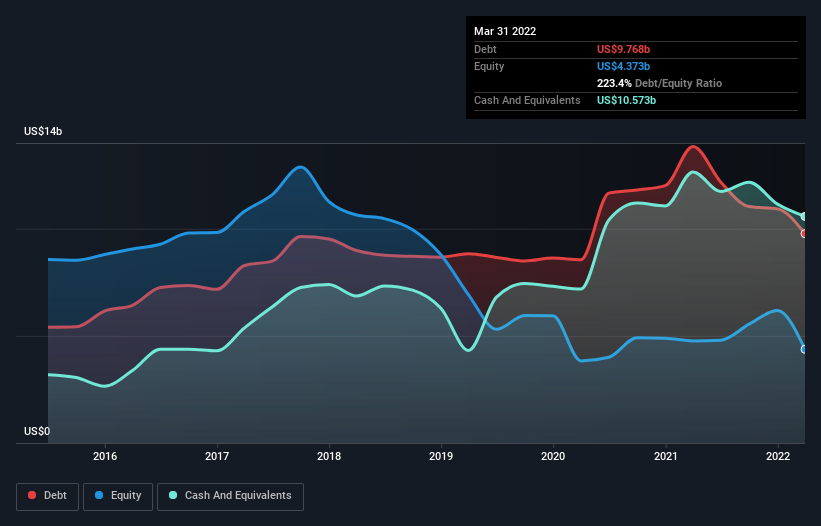Booking Holdings (NASDAQ:BKNG) Has A Pretty Healthy Balance Sheet
The external fund manager backed by Berkshire Hathaway's Charlie Munger, Li Lu, makes no bones about it when he says 'The biggest investment risk is not the volatility of prices, but whether you will suffer a permanent loss of capital.' It's only natural to consider a company's balance sheet when you examine how risky it is, since debt is often involved when a business collapses. As with many other companies Booking Holdings Inc. (NASDAQ:BKNG) makes use of debt. But the real question is whether this debt is making the company risky.
When Is Debt A Problem?
Debt is a tool to help businesses grow, but if a business is incapable of paying off its lenders, then it exists at their mercy. If things get really bad, the lenders can take control of the business. While that is not too common, we often do see indebted companies permanently diluting shareholders because lenders force them to raise capital at a distressed price. By replacing dilution, though, debt can be an extremely good tool for businesses that need capital to invest in growth at high rates of return. The first step when considering a company's debt levels is to consider its cash and debt together.
See our latest analysis for Booking Holdings
What Is Booking Holdings's Debt?
As you can see below, Booking Holdings had US$9.77b of debt at March 2022, down from US$13.8b a year prior. But it also has US$10.6b in cash to offset that, meaning it has US$805.0m net cash.
How Strong Is Booking Holdings' Balance Sheet?
We can see from the most recent balance sheet that Booking Holdings had liabilities of US$7.48b falling due within a year, and liabilities of US$10.5b due beyond that. Offsetting these obligations, it had cash of US$10.6b as well as receivables valued at US$1.61b due within 12 months. So its liabilities outweigh the sum of its cash and (near-term) receivables by US$5.83b.
Given Booking Holdings has a humongous market capitalization of US$86.0b, it's hard to believe these liabilities pose much threat. Having said that, it's clear that we should continue to monitor its balance sheet, lest it change for the worse. While it does have liabilities worth noting, Booking Holdings also has more cash than debt, so we're pretty confident it can manage its debt safely.
It was also good to see that despite losing money on the EBIT line last year, Booking Holdings turned things around in the last 12 months, delivering and EBIT of US$3.2b. The balance sheet is clearly the area to focus on when you are analysing debt. But it is future earnings, more than anything, that will determine Booking Holdings's ability to maintain a healthy balance sheet going forward. So if you're focused on the future you can check out this free report showing analyst profit forecasts.
But our final consideration is also important, because a company cannot pay debt with paper profits; it needs cold hard cash. While Booking Holdings has net cash on its balance sheet, it's still worth taking a look at its ability to convert earnings before interest and tax (EBIT) to free cash flow, to help us understand how quickly it is building (or eroding) that cash balance. Happily for any shareholders, Booking Holdings actually produced more free cash flow than EBIT over the last year. There's nothing better than incoming cash when it comes to staying in your lenders' good graces.
Summing up
While it is always sensible to look at a company's total liabilities, it is very reassuring that Booking Holdings has US$805.0m in net cash. The cherry on top was that in converted 139% of that EBIT to free cash flow, bringing in US$4.4b. So is Booking Holdings's debt a risk? It doesn't seem so to us. When analysing debt levels, the balance sheet is the obvious place to start. However, not all investment risk resides within the balance sheet - far from it. We've identified 3 warning signs with Booking Holdings , and understanding them should be part of your investment process.
If, after all that, you're more interested in a fast growing company with a rock-solid balance sheet, then check out our list of net cash growth stocks without delay.
Have feedback on this article? Concerned about the content? Get in touch with us directly. Alternatively, email editorial-team (at) simplywallst.com.
This article by Simply Wall St is general in nature. We provide commentary based on historical data and analyst forecasts only using an unbiased methodology and our articles are not intended to be financial advice. It does not constitute a recommendation to buy or sell any stock, and does not take account of your objectives, or your financial situation. We aim to bring you long-term focused analysis driven by fundamental data. Note that our analysis may not factor in the latest price-sensitive company announcements or qualitative material. Simply Wall St has no position in any stocks mentioned.

 Yahoo Finance
Yahoo Finance 
